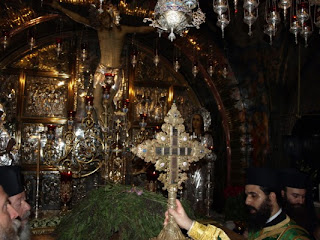O.C.S.O. M G M - 2011 Assisi
WEDNESDAY, SEPTEMBER 14, 2011
Mass in the basilica
We started the second week of the Mixed General Chapters celebrating the Feast of the Exaltation of the Cross with a mid morning Mass in the basilica of Santa Maria degli Angeli, built over the Proziuncula, the tiny, beautiful chapel of the time of St. Francis. This Feast was the opening day of the General Chapter in Cîteaux for centuries, and thus has a special significance for our Order. Today we had the joy of having Cardinal João Braz de Aviz, the Prefect of the Congregation of Religious life, as our main celebrant and guest of the MGM. The Cardinal is Brazilian and well known by some of our Latin American superiors.
For our daily morning Mass we use a large hall in Domus Pacis, and it was a special joy to have the mass in the basilica, where the beauty of the Gregorian chant was enlarged under the high vaults. A large part of the abbots and priests at the MGM concelebrated, and it gives an extra experience of the universal Church when you see so many priests from different parts of the world walking up the isles. At this MGM we have our two former Abbot Generals present, Dom Ambrose Southey, former abbot of Mt. St. Bernard, and Dom Bernardo Olivera, present abbot of Azul, who were at the main altar together with the Cardinal and the abbot general, Dom Eamon Fitzgerald.
Cardinal Braz de Aviz gave his homily in Italian, and there was no translation given. But if you know a little bit of Latin, a little bit of French and a little bit of Spanish, and you know the gospel of the day, you can guess some of his points with a certain surety. As far as I could understand, he spoke about how we transmit our faith, not through proselytism, but passing on the interior experience. Christ is looking at us from the cross, seeing our lives from this perspective. Our society rejects suffering and limitations, but there is no other way to God than through the cross. By contemplating the mystery of the cross, the contradictions it presents us with, we can give this serene witness of our faith. It is the Lord of Heaven and Earth who is crucified, showing us that God has a human heart, yet so much greater. Through being crucified, Jesus showed that nobody can deny that he or she is loved by God. The graces the Church gives us enable us to live this love of God. He encouraged us to follow the way our founders pointed out, living according to the Rule of St. Benedict.
The Mass can be seen on the web site http://www.ustream.tv/recorded/17261759
About saints and miracles
Wednesday was also used for the work in the mixed commissions on the House Reports. But we did take time to listen to a few reports in a short plenary session. One was about the Central Secretary of formation, who has to be elected after sr. Katharina of Nazareth resigned in April this year due to too work commitments in her community.
The other report was about the work of the postulator, Sr. Augusta of Vitorchiano:
The canonization of our Brother Rafael of San Isidro in Spain took a lot of work, but now this young Cistercian oblate is well known. He was chosen as one of the patrons of the World Youth Day in Madrid in August, and there has been catechesis and presentations about him in Spain.
The sanctity of the young Sardinian sister Gabriella of Vitorchiano is well known all over the world, because of the interest for ecumenism. (She gave her life for the unity of the Church.)
This is also the case of our brothers of Tibhirine. The cause for their beatification continues: The historical commission will probably finish their work by the end of this year, the theological censors theirs at the beginning of next year. Perhaps the diocesan process can be closed in the coming year, and then the Roman phase will start: Count on that taking ten years at least,says sr. Augusta in her report.
In this period of time other things may come up entering the cause, documents from outside the regular processes, eventual developments and findings of the juridical inquiry, and anything that could be useful for arriving at a calm and truthful verdict about their sanctity. The cause of our brothers of Tibhirine was not introduced by our Order, but by the diocese of Argel, but the Order is involved in cases that deals with its members.
The postulator has refused to present the request of La Oliva for the introduction of the cause of brother Zacarias because the documentation is meager and the fame of his holiness is not widely spread. She has also declined the request of lay people for the introduction of the cause of father Filiberto Guala of Frattocchie.
The work of the postulator includes much correspondence, sending of materials, information and publications, translations, and examining of reports of graces received. – Sometimes these are important, but no real miracles, she says in her report: - Any case not accompanied by serious documentation is immediately discarded. If the documentation is good I give it to sisters who are medical doctors or other specialists to examine. In 99 % of the cases there are natural explanations. So I have disregarded the presumed miracle of Michael Tansi and another attributed to Fr. Romano Bottegal.
So, no big news, says sr. Augusta.
Miracles or not, documentations or not, the call to sanctity remains!
Sr. Hanne-Maria of Tautra



.jpg)
.jpg)
.jpg)
.jpg)
.jpg)
.jpg)

.jpg)






